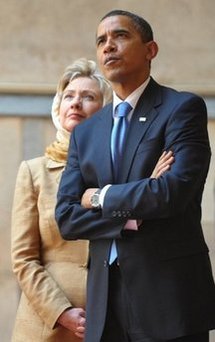Frustration grows over Obama's Mideast policy: experts
Acil Tabbara
DOHA, Acil Tabbara - Hopes of a new US approach to the Muslim world under President Barack Obama are giving way to frustration over the deadlock in Middle East peace efforts, participants in a US-Islam forum said on Sunday.
Eight months after Obama addressed the Muslim world from Cairo, prospects for a US policy shift in the region are fading, said Shibly Talhami, a US academic of Arab origin.

US President Barack Obama and US Secretary of State Hillary Clinton tour the Sultan Hassan Mosque in Cairo in June 2009 (AFP/File/Mandel Ngan)
On June 4, Obama called for a fresh start in relations between the United States and the Muslim world, in an apparent break from the policies of his predecessor George W. Bush.
Washington led the invasion of Taliban-ruled Afghanistan in 2001 and of Saddam Hussein's Iraq, another Muslim country, two years later, under Bush.
Talhami said there was a general "frustration about the Obama administration," due mainly to the lack of progress in the Israeli-Palestinian peace process.
Obama's election as US president had a "tremendous positive impact" in the Arab world, said former Egyptian diplomat Nabil Fahmy.
But positions adopted since his election have been "disappointing," he said, pointing to Washington "backing down on (Israeli) settlements (in the West Bank) and saying it is up to the Palestinians to take steps," he said.
The US president on Saturday reiterated his commitment to work towards ending the Israeli-Palestinian conflict based on a two-state solution, in a video address to the forum.
He also named a special representative at the largest pan-Islamic body -- the Organisation of the Islamic Conference.
"It has only been eight months since Cairo, and much remains to be done. But I believe we've laid the groundwork to turn those pledges into action," Obama said.
Prominent Egyptian-US human right activist Saadeddine Ibrahim said Obama had so far been "a big disappointment" in the Arab world.
"People expected action to follow the (Cairo) speech ... They expected Obama to exert pressure on the Israelis but he did not," he said.
"The United States took some action, like the appointment of (Middle East peace envoy) George Mitchell, but this has not produced results," he said.
Ibrahim, however, said Obama was still "more positively perceived than other US presidents."
Mitchell completed last month a round of shuttle diplomacy between the Jewish state and the Palestinians and proposed an initiative to relaunch peace talks.
The plan calls for Israel to loosen its hold on some Palestinian-controlled areas, release a number of prisoners and ease a virtual blockade of the Gaza Strip, according to a Palestinian official.
But the "indirect talks are a regression after 20 years of proximity talks," chief Palestinian negotiator Saeb Erakat said during the round-table discussions in Doha.
Israeli Prime Minister Benjamin "Netanyahu is the one placing obstacles in the way of the Obama administration," he said. "You (Obama) need to answer us now: why the US cannot recognise two states now?"
"It is time to move in this direction. You want to defeat extremism in the region, the key is here. If not, extremism and (Al-Qaeda leader Osama) bin Laden will be winning," he said.
---------------------------------------------------------------